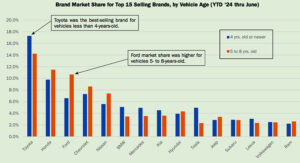EPA rules would dramatically increase the number of Zero Emission Vehicles (ZEVs) on the road
Bowie, Md.—The Tire Industry Association (TIA) has joined with the American Highway Users Alliance in opposing two recently proposed rules by the Environmental Protection Agency (EPA) that would dramatically increase the number of Zero Emission Vehicles (ZEVs) on the road.
The Bowie-based association with 12,000 tire dealer and tire industry members will submit comments against both proposed rules and already has had multiple conversations with members about their potential impact, said Roy Littlefield IV, TIA vice president of government affairs.
On April 11, the EPA announced it is seeking new aggressive emissions standards for light- and medium-duty vehicles — cars, trucks and vans weighing up to 14,000 pounds — that could require up to 67% of new vehicle sales to be ZEVs in 2032. The agency also announced Phase III of its greenhouse gas regulations, which would set increasingly stringent emissions standards for model years 2027-2032 trucks and buses.
The EPA is singularly proposing the new rules as the agency had worked previously with the National Highway Traffic Safety Administration (NHTSA) on truck and bus greenhouse gas rules for corporate average fuel efficiency (CAFE) standards for vehicles. Because of this, the proposed rules on light and medium-duty vehicles would not be considered new CAFE standards by the EPA but rather new emission standards for nitrogen oxides (NOx), particulate matter (PM), ozone, carbon dioxide (CO2) and other greenhouse gases.
In its comments opposing the proposed rules, Littlefield said TIA will urge the EPA to reconsider them over concerns that the new standards could negatively impact the Highway Trust Fund.
“If implemented without addressing the funding structure, these proposed regulations could strain the already precarious state of transportation funding,” Littlefield said. “It is crucial to consider additional solutions, such as a low carbon fuel standard, to address the revenue lost by having fewer internal-combustion engines on the road.”
The period for comments closes July 5.
The full proposed rule for light and medium-duty cars, trucks and vans can be viewed here.






Comments are closed.